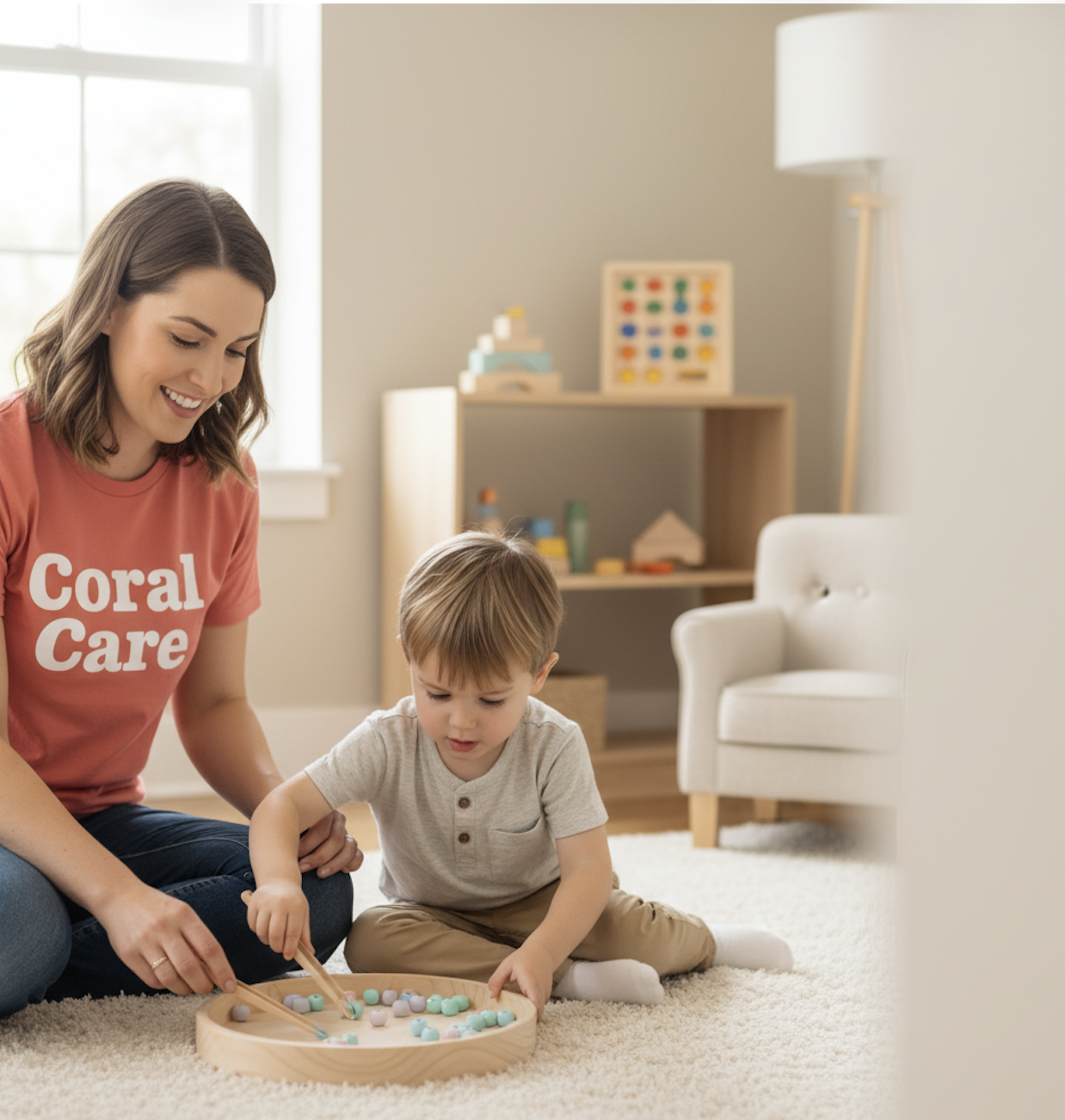
Coral Care content is reviewed and approved by our clinical professionals so you you know you're getting verified advice.
Find effective support for developmental delays, quickly.



Concerned about your child's development?
Our free screener offers guidance and connects you with the right providers to support your child's journey.
In-home pediatric physical therapy offers therapy services in your child’s home. It aims to help them meet developmental milestones and improve mobility. This article explains what in-home pediatric physical therapy is, when it’s needed, and its benefits.
Key takeaways
- In-home pediatric physical therapy offers personalized care tailored to a child’s unique environment, enhancing their comfort and engagement during sessions.
- Early intervention is crucial, as addressing developmental delays within the first three years leads to better outcomes and helps children meet key milestones.
- Active family involvement in therapy sessions fosters collaboration and ensures that parents are equipped to support their child’s development at home.
Coral Care is emerging as a leader in pediatric care and will get you set up with an in-home physical therapist in two weeks or less, guaranteed.
Understanding in-home pediatric physical therapy

In-home pediatric physical therapy delivers therapeutic services in the child’s home, helping them reach their fullest potential, manage various conditions, and enhance their independence. Pediatric physical therapy focuses on helping children achieve developmental milestones, improving mobility, and reducing discomfort (John Hopkins Medicine). The beauty of home-based physical therapy is that it serves children from birth up to 21 years of age, ensuring that assistance is available throughout a significant portion of their developmental journey (Rush Physical Therapy).
Pediatric physical therapy supports children in reaching and regaining crucial developmental skills. These milestones might include rolling over, crawling, standing, walking, and other fundamental motor skills. Since children are still in their developmental stages, timely and effective physical therapy becomes even more essential. Much like in-clinic services, mobile pediatric therapy provides comprehensive care but with the added advantage of being conducted in the child’s familiar home environment.
In-home therapy provides many families with a sense of relief and convenience. It saves time, reduces the hassle of traveling to appointments, and allows therapists to create highly personalized treatment plans tailored to the child’s home environment. This approach ensures that therapy is seamlessly integrated into their daily routines, making the therapeutic process more natural and effective.
When does a child need physical therapy?
Identifying when a child needs physical therapy can be challenging for parents. Common indicators include difficulty with gross motor skills, such as not rolling, crawling, or walking at appropriate ages. A child not meeting developmental milestones might benefit from pediatric physical therapy. A child’s ability to reach these milestones can be impacted by various factors, including injuries or medical conditions (Spokane Valley Physical Therapy).
Specific conditions like genetic disorders, cerebral palsy, and autism often necessitate physical therapy interventions. For instance, children with cerebral palsy may struggle with muscle tightness or looseness, limited motion, and coordination issues that need to be addressed through targeted therapy (National Institute of Neurological Disorders and Stroke). Essentially, pediatric physical therapy is very helpful in helping children who may be having developmental delays or other extenuating circumstances.
Physical therapy is not just about addressing limitations; it’s about empowering young patients to overcome challenges and reach their full potential. Managing pain, improving strength and coordination, and enhancing overall physical abilities through early intervention can significantly impact a child’s development and quality of life.
Personalized treatment plans
One of the most significant advantages of in-home pediatric physical therapy is the ability to create highly personalized treatment plans. Pediatric physical therapists design these plans based on detailed evaluations that consider each child’s unique developmental needs and interactions within their living space. This personalized approach ensures that therapy is not only effective but also seamlessly integrated into the child’s daily life.
Observing how children interact with their home environment helps therapists develop more effective treatment strategies. For instance, they might suggest home modifications to facilitate easier mobility or recommend specific exercises that can be performed using household items. Regular observations and reassessments enable this level of customization, allowing the treatment plan to evolve as the child progresses.
In-home pediatric therapy also adapts treatments to improve the child’s ability to perform daily activities. Therapists tailor their approach to enhance the child’s ability to move independently or use assistive technology to support daily functions. Focusing on personal care ensures each child receives the most beneficial and effective therapy.
Benefits of home-based physical therapy

Home-based physical therapy offers numerous benefits that can significantly enhance the therapeutic experience for children and their families. One of the most notable advantages is the comfort and familiarity of the child’s home environment. Children feel more at ease and engaged in a familiar setting, leading to better responsiveness and participation during therapy sessions.
Another significant benefit of in-home physical therapy is the convenience it offers to families. Home-based physical therapy eliminates travel, saving time and reducing the stress associated with commuting to sessions. This convenience is particularly valuable for families with multiple children or those in areas with limited access to pediatric therapy clinics.
Having consistent therapists throughout a child’s development ensures continuity of care and a deeper understanding of the child’s needs and progress. This consistent and personalized approach can lead to more effective therapy outcomes, helping children achieve their developmental goals more efficiently.
Enhancing developmental milestones

Developmental milestones are a critical aspect of a child’s ability. These milestones, such as sitting up, crawling, and walking, are essential for managing and interacting appropriately with their environment. Every child reaches these milestones at their own pace, but there are general age benchmarks for skills like walking and fine motor skills.
For instance, by 12 months, children should typically be able to crawl on their hands and knees, pull themselves up to stand, and take a few steps without support. By 18 months, they are generally expected to walk, albeit with a broad-based gait for balance, and to push a ball (United States CDC). In-home pediatric physical therapy provides targeted interventions that support children in achieving developmental milestones.
While therapy can assist children in overcoming developmental delays, it can also prove to be extremely helpful for overcoming sensory issues. For example, sensory-supportive interventions can help children with sensory processing disorders develop motor skills and improve daily living activities. The expansive breadth of physical therapy ensures children meet developmental milestones and thrive in daily life.
Family involvement in therapy sessions
Another unique advantage of in-home pediatric physical therapy is the active involvement of family members in sessions. The home setting allows multiple caregivers to participate, enhancing the support and education they receive. This collaborative approach ensures that everyone involved in the child’s care is on the same page and can contribute to the child’s development.
Parent involvement is particularly crucial, as therapists often coach parents on strategies to better support their child’s development and coping skills. Learning these techniques allows parents to support their child’s progress outside scheduled sessions, creating a more effective therapeutic environment. Collaboration between parents and therapists fosters informed decision-making and allows for necessary adjustments to therapy goals. Active participation in therapy sessions also enhances trust and communication in the parent-child relationship, contributing to better overall outcomes.
Early intervention for better outcomes
Early intervention is vital for effective pediatric physical therapy. The most significant brain development occurs in the first three years of life, making early intervention particularly effective within this crucial time frame (National Institute of Health). Addressing developmental delays early helps therapists minimize these delays and enhance overall development.
Delays in meeting milestones can lead to poor muscle development and difficulties in social interactions, meaning amending these barriers in a timely manner is paramount. Early intervention programs are available nationwide and provide families with the resources they need to manage these challenges, including those related to gross motor delay. Eligibility for these programs is based on the severity of developmental delays, ensuring those who need it most have access to support.
Helping infants and toddlers with developmental delays learn basic and new skills is a primary focus of early intervention. Establishing stable routines and providing consistent support through early intervention fosters a sense of security and independence in children, setting the foundation for lifelong success.
Specialized therapies available
Specialized therapies often complement in-home pediatric physical therapy, addressing various aspects of a child’s development. These specialized therapies include occupational therapy, physical therapy, and speech therapy, all of which play a vital role in supporting children’s growth and development (and are all available through Coral Care!).
For example, occupational therapy helps children achieve independence in daily activities, potentially involving the evaluation of assistive devices. Speech-language pathologists assist children in improving communication skills and addressing speech and language disorders. Vitalstim therapy is another specialized approach that helps children, including those with feeding tubes, improve their ability to chew and swallow.
Early intervention services include these therapy services to address developmental delays during the crucial first five years. By incorporating these specialized therapies into a child’s treatment plan, families can ensure comprehensive support that addresses all aspects of their child’s life and development.
How to get started with in-home pediatric physical therapy

Starting with in-home pediatric physical therapy is straightforward with Coral Care. Parents can contact Coral Care via phone, email, or through their contact form to ask questions and receive guidance on the next steps. This initial contact helps understand available options and determine the best course of action for their child.
Within two weeks, physical therapists conduct an initial evaluation to assess the child’s needs and create a tailored treatment plan once therapy begins. This personalized approach ensures that the therapy provided is effective and aligned with the child’s specific developmental goals.
Starting in-home therapy can seem daunting, but with proper guidance and support, parents can navigate this process smoothly. Coral Care is on your side and supporting you every step of the way. By taking the first step and reaching out for help, families can provide their children with the tools they need to thrive. Learn how to start with Coral Care today!
Choosing the right pediatric therapist

Choosing the right pediatric therapist ensures effective and personalized care. Verifying the therapist’s qualifications, including education, licensure, and ability to provide necessary services, is important. A qualified therapist with the right expertise can significantly impact the child’s development.
Selecting a therapist who specializes in the child’s age group and concerns can enhance treatment effectiveness. All therapists at Coral Care are pediatric specialists, on average having 13 or more years of experience. Involving the child’s primary healthcare provider in the selection process can provide valuable insights and recommendations. This collaborative approach ensures that the chosen therapist is well-suited to address the child’s unique needs.
Therapists may use approaches like play therapy or cognitive behavioral therapy, depending on the child’s situation. Selecting a therapist who aligns with the child’s needs and personality ensures a positive and productive therapeutic experience.
Summary
In-home pediatric physical therapy offers a myriad of benefits, from personalized treatment plans to the convenience of receiving care in the comfort of the child’s home. This approach not only supports the child’s developmental milestones but also involves the family in the therapeutic process, ensuring holistic and continuous support.
By starting early and choosing the right therapist, families can provide their children with the best possible care, setting the foundation for lifelong success. In-home therapy is more than just a convenience; it’s a transformative approach that helps children reach their full potential in a familiar and supportive environment. Get your child the help they need on your terms, and start with Coral Care today.
Frequently Asked Questions
Getting started with in-home pediatric physical therapy is simple—just reach out to a service like Coral Care through phone, intake form, or email, and they’ll guide you through the process with helpful information and support. You'll be on the right track to enhancing your child's development in no time!
Home-based physical therapy provides the comfort and convenience of receiving care in your own space, leading to better engagement and a stronger connection with your therapist. This consistency in care greatly enhances your progress and overall experience!
Personalized treatment plans are crafted by thoroughly assessing a child's distinct developmental needs and their interactions at home. This tailored approach ensures the plan effectively supports each child's growth and well-being.
A child should start physical therapy if they're struggling with gross motor skills or not meeting developmental milestones. Early intervention can greatly improve their movement and overall development!
In-home pediatric physical therapy is a positive and personalized approach that delivers therapeutic services right where your child feels most comfortable. This allows them to thrive and effectively manage their specific needs in a familiar environment.





